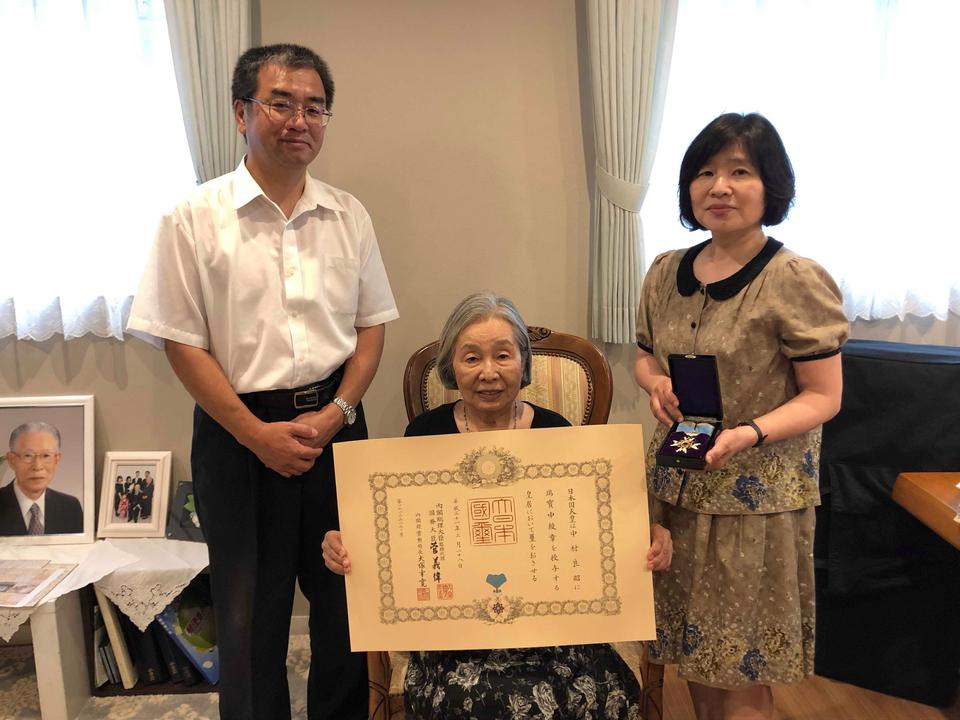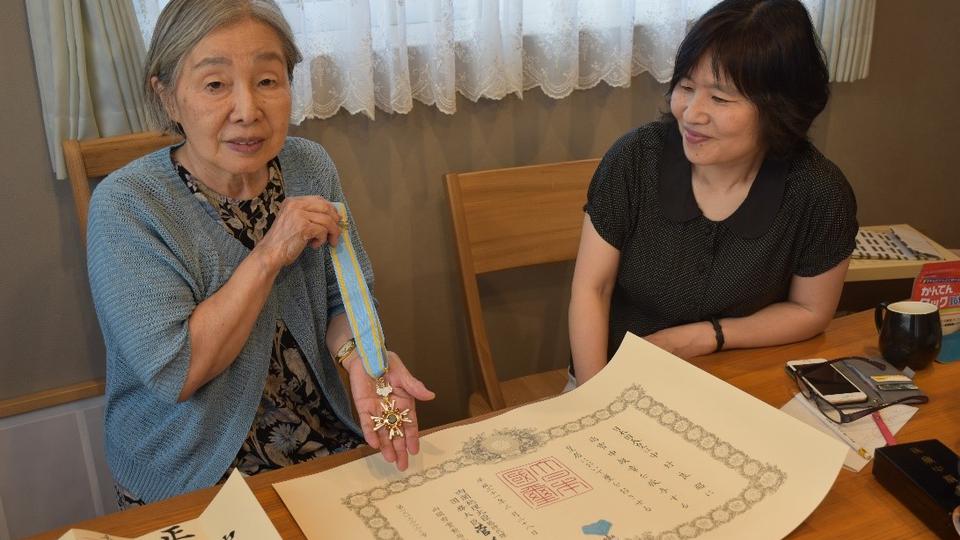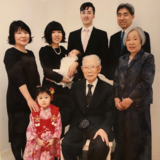| Sister Noriko Nakamura accepts the Order of the Sacred Treasure from the Miyazaki National Hospital administrator, Masatoshi Higuchi, with her daughter, Masami Shichijo, July 1, 2019. 2019 by Intellectual Reserve, Inc. All rights reserved. | 1 / 3 |
Ryosho Nakamura, former Fukuoka Temple President and Stake Patriarch in the Tokyo, Japan Stake, was awarded the Order of the Sacred Treasure by His Excellency the Emperor of Japan. The award was given for meritorious service over his 27-year career as a heart surgeon and hospital administrator in Kumamoto and Miyazaki, Japan. Dr. Nakamura’s wife, Noriko Nakamura, received notice of the award on March 28 at the hospital, the same day her husband passed away. The award was presented in their home on July 1, 2019.
Dr. Nakamura began his career as a heart surgeon in Kumamoto in 1961, where he began research on artificial hearts. In 1967, he was awarded a Fellowship with Cornell University and he took his young family to New York City. Working alongside Dr. S. Frank Redo, they constructed various models of artificial hearts, transplanting them into German shepherds. Newsweek magazine published an article on their efforts on December 18, 1967, entitled ‘The Promises and Perils of Transplant Surgery’. This research was conducted prior to the first human cardiac transplant performed at Columbia University, in 1977.
After returning to Kumamoto in 1969, Dr. Nakamura resumed his duties as a heart surgeon. Several years later, in 1971, Sister Nakamura answered her door to find two young missionaries from The Church of Jesus Christ of Latter-day Saints. She was impressed with their appearance and spoke with them for a few minutes. When they asked if they could return to share a message, she asked them to come back on Sunday night, when her husband would be home. The family was impressed with their message and was baptized three months later.
When asked why they decided to be baptized, Sister Nakamura explained that her grandfather played a role in that decision. He was also a doctor, and a practicing Buddhist. He taught young Noriko to say her prayers morning and night and took her to Sunday School. The night before their wedding, her grandfather had a talk with Dr. Nakamura, who did not belong to any religion. Her grandfather told him, “a doctor must have faith. It may not matter what religion he follows, but if he does not have faith, he will find a limit to his ability and be unable to help his patients.” Dr. Nakamura pondered this thought in his heart.
Several years after being baptized, he was called as the Branch President. During that two-year period, a new building was built in Kumamoto. Dr. Nakamura did not perform any heart surgeries while serving as the branch president. However, he resumed his duties as a heart surgeon after his release. Years later, he transferred to the Japan National Hospital in Miyazaki, where he served as deputy and director of the hospital, and director of the nursing school. Dr. Nakamura retired in 1988 to become a missionary in the Tokyo Temple.
In 2006, the Nakamura’s were called as Temple President and Matron of the Fukuoka Japan Temple, where they served for three years. The staff was small, just the Temple Presidency and their wives, but they felt great pleasure during the time they served together.
When asked what this award means to her, Sister Nakamura responded, “when I look at this, I think of how kindly he treated his patients. Because he was blessed with the love of God, he was able to share that with his patients.” Sister Nakamura did not feel it was disappointing that the award was announced after his death. “Truly, he would have felt that this award belonged to all Church members. He could not have accomplished the things he did if he had not been a member of the Church. This award belongs to all of them.”
Dr. Nakamura’s daughter, Masami Shichijo, will always remember the special way her father helped his patients gain hope. “He taught his patients that life consisted of two parts; the spirit and the body. He told them that doctors can treat their bodies but cannot heal them. To be healed, the spirit must have a willingness to be healed. Doctors cannot heal the body unless the spirit is willing. They must have a desire to be healed and to live. My father understood that only God could heal a person.”
The Order of the Sacred Treasure, with Gold Rays and Ribbon, is a third-class award from the Emperor for meritorious service in a public setting, such as a government office or hospital, over a long period that benefitted the public in Japan. It is also a fifth-grade Japanese government award.




